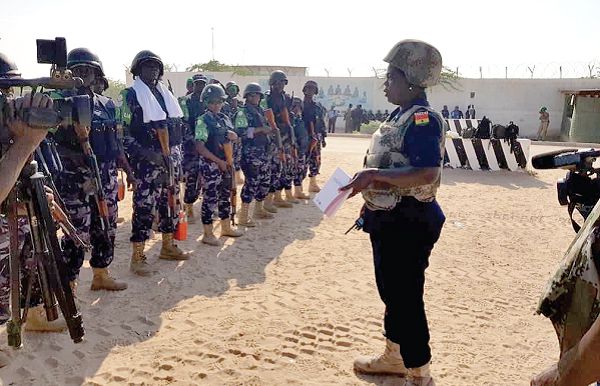
AU commends Ghanaian Police Contingent in Somalia
The presence of personnel of the Ghana Police Service in Somalia has greatly contributed to the prevailing peace in the volatile country, the Head of the African Union Mission in Somalia (AMISOM), Ambassador Francisco Caetano Jose Madeira, has stated.
According to him, police officers from Ghana "are very professional and hardworking. They are playing a key role in capacity building of the Somali Police, mentoring them and supporting restoration of rule of law in different parts of the country”.
Mr Madeira made the commendation during an interaction with 13 journalists from Ghana and Nigeria who are on a field visit to Somalia at the invitation of AMISOM.
Ghana currently has a contingent of 37 individual police officers (IPOs) serving with AMISOM, a vital institution to the advancement of security in Somalia.
Other members of the AMISOM are Nigeria, Uganda, Kenya, Sierra Leone and Zambia.
In all there are 718 AMISOM personnel from the six contributing countries serving in Somalia.
Gratitude
Mr Madeira, who is also the Special Representative of the Chairperson of the African Union Commission (SRCC) for Somalia, expressed gratitude of the AU to the participating countries “for providing us with officers with the right skills” to help the war torn country in its rebuilding process.
He also described the police personnel as heroes in the war environment, adding that the personnel have become the “darling of everyone and the people of Somali are appreciative of them.
They have good levels of qualification and knowledge and the efficiency with which they handle their duties is just exceptional.”
AMISOM
A decade-long civil war was sparked by rival clan warlords in Somalia in 1991 following the ousting of President Mohamed Siad Barre who headed a coup in 1969.
His reign was characterised by persecutions, jailing and torture of political opponents and dissidents.
As part of processes to create a stable environment for post-conflict recovery, AMISOM was formed by the African Union (AU) Peace and Security Council on January 19, 2007.
It was mandated to stabilise the situation in Somalia to create conditions for humanitarian activities and a transfer of authority to the UN after six months.
However, the UN did not take over the mission.
And over the years, their mandate has since been expanded to include support for the Federal Government of Somalia (FGS) to reduce threats posed by al-Shabaab and other armed opposition groups.
It also supports the FGS in expanding control over the national territory and assisting in establishing conditions for effective and legitimate governance across Somalia.
AMISOM has three components: Military, Police and Civilian.
Achievements
In the past 11 years that AMISOM has been in Somalia, Mr Madeira said: “We have made extensive achievements despite the challenges we face.”
He listed some of the achievements to include the creation of a more secure environment for socio-economic and political development in Somalia.
“Today, Somalia has a national constitution, an elected parliament and President and functional legislative bodies.
Preparations are already underway for the next elections in 2020,” Mr Madeira said.
Somalia, which is described as the horn of Africa and was destroyed by the civil war, is now experiencing an economic boom.
“The city of Mogadishu and other major towns are vibrant.
Businesses are opening up at a fast rate, Somalis are returning home from the diaspora and there is evidence of vigorous economic activities in all corners of the country,” he added.
According to him, the real estate sector was also being revived while the Somali economy was currently being assessed by the International Monetary Fund (IMF) which was also supporting efforts towards the implementation of key reforms including the introduction of a new currency.
Tour
The journalists who were dressed in body armour and protective head gears were taken round the area to have a first-hand experience of the work of AMISOM.
Among areas visited was Kaaran, one of the communities in Mogadissu where the AMISOM police was assisting the Somali Police Force to enhance their capacity to international standards.
Other areas included Shibis and Kilometre zero, which is recognised as the Centre of Somalia where they witnessed bullet-ridden buildings such as the reconstructed Doobin Hotel which has been sited at some few metres away from where it original stood following a number of bomb attacks.
Other structures that were destroyed in the war were the Djubba Hotel, the Commercial Bank of Somalia, schools among others.
